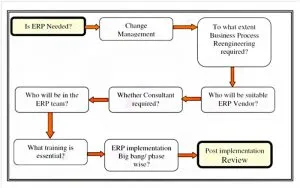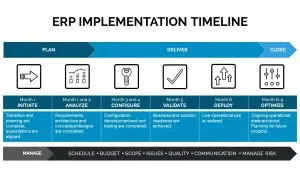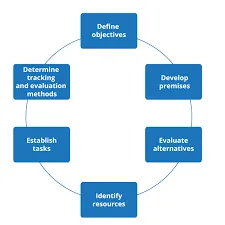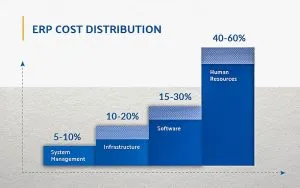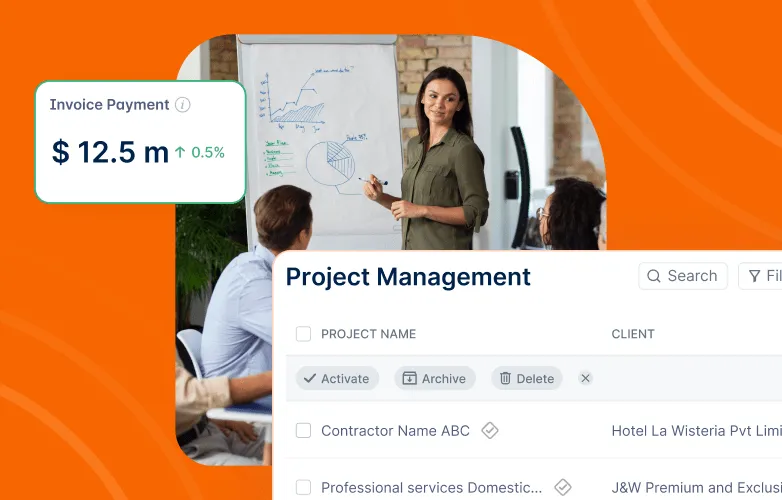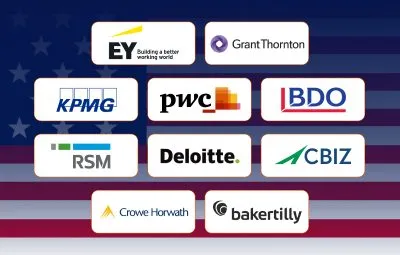ERP IS VITAL FOR ALL BUSINESS MACHINERY for automating business processes and centralized data sources for all hierarchies. Integrating ERP systems is gaining immense popularity among entrepreneurs. It enables enterprises to gain advantages over competitors by saving resources and responding to a dynamic business environment. That is why Organizations across the globe are following customized paths to be more productive and efficient.
Nevertheless, implementing ERP can be pretty complex and challenging as it affects business processes across the organization.
“Most times, ERP implementation fails due to our over-emphasis on getting desired results but reluctant to change the way we’re used to “
Why Is an ERP Implementation a Challenging Task?
Implementing ERP is a hard nut to crack because it is a complex process and affects the entire organization. It causes a paradigm shift in working mechanisms by paving the way for automation instead of manual processes.
It compels everyone to address the ERP implementation challenge and getting users and functional groups to work out the new solution. As it requires senior management intervention in overcoming such difficulties ——the organization needs a committed project team to represent all users on the ERP platform. Hence, it emphasizes the needs of business processes across all hierarchies and departments.
Here, we’ll outline some top ERP implementation challenges and discuss ways to tackle them:
An ERP implementation is all about finding the right balance between people and technology. Organizations may face people-related challenges such as resistance to change, as well as technical obstacles. These are the common ERP implementation challenges include:
1. Selection of ERP Vendors
In this competitive business-centric environment, implementing the right resources is the gateway to achieving productivity gains. When you land your feet in the ERP market, you’ll see thousands of existing ERP applications as everybody is claiming to be the best. However, you can’t go by their claims and choose that meets your business needs.
Hence, before you go ahead and rope in ERP applications development for business, one should do a case study about portfolios, industry verticals, experiences, clients, etc.
2. Tenacity and Commitment From Top Management
Senior managers are the key decision-makers for any organization while implementing ERP. Their involvement is essential for the success of a project. So any form of ignorance and laxity may cause ineffective decisions and delayed operations. Keeping the morale up remains a challenge itself. If you want to make ERP Implementation successful, the management needs to be charged up.
3. Proper & Adequate Training
Once the ERP system is implemented, resentment from employees is an ordinary happening and may result in downgrading productivity. So you can’t let unskilled or semiskilled staff go onboard. The existing team should get the proper training to be familiar with the software.
4. Implementation Time
Many companies don’t realize the time consumption of an ERP implementation process. An ERP system is implemented step by step as you initiate, analyze, configure, validate, deploy, optimize the business process. Because it is very standard, it needs to be designed for a particular business to handle its operations.
5. Proper Planning & Management
Forecasting and estimation are the keys to a successful ERP implementation. No entrepreneur would want to see their budget overruns- when a business adds capabilities or features to the system, which is an ADD-ON to the original plan, and underestimates staffing needs as per STATISTA reports.
When you work with clear goals and realistic plans, you’re bound to overcome such issues. Acknowledging realistic plan speed bumps and minor cost overruns and address things in advance while the decision-making process keeps the project on track.
Companies that want to implement the ERP system need to align capable employees for successful ERP implementation. Usually, companies seek an external source, but often internal employees are preferred.
——————————————————————————————————————————————————————————————————
Also Read: Things to Look Up Before Purchasing A Billing Software for Small Business
——————————————————————————————————————————————————————————————————
6. Cost Incurred on Implementation
When you’re implementing ERP, the cost incurred is higher than the initial costs. So it all depends on the customization cost. When the customization cost is more, the higher will be the implementation cost. So you have to be proactive about the possible costing affecting your budget.
7. Employee Retention
Despite the training provided, employees leave the organization after the implementation of ERP, as it can be a major dent in a company’s growth. As they think, the tasks they used to do are automated and often devalued and cause a sense of insecurity. Therefore, you need an offshore software development company in India that can create excellent ERP for your firm.
8. Sufficient Testing
Testing an ERP system doesn’t mean whether it’s working smoothly or not, but to be delighted by its performance and see if it is up to the business needs. Insufficient testing of the system can attract costly unplanned updating.
9. Maintenance Cost
If you’re an entrepreneur, Implementing ERP is not the final frontier. It has maintenance costs attached, which takes a toll on overall expenses and eventually pulverize your plans. A successful ERP implementation often needs periodic maintenance, including system management, infrastructure, software, and human resources.
10. Investment In Internal Hardware
Working on a slow system can be very unproductive and frustrating. ERP applications require sufficient storage and high work performance. Low investment in internal hardware may result in various software issues and leads to unprecedented business downfall. Therefore, you should hire expert software developers in India to ensure the best ERP for your company.
How can Invoicera contribute to ERP implementations?
Invoicera is a complete enterprise-specific customized solution for enterprise billing and will be very helpful in overcoming hassles in ERP implementation. It can very much benefit your expense management, project planning, manufacturing, and staff management, which are considered significant roadblocks for enterprises.
When you streamline ERP implementation with AI-enabled software like Invoicera as you channelize your business in the right direction. Invoicera makes the entire process autonomous, which minimizes manual process, as you’ll always find some loopholes. When you have streamlined cloud-enabled data, you get a secured overview from any part of the world. Also, It helps you better manage expenses. This is where Invoicera gives you a “cut above the rest” and helps better implement ERP with benefits like:
- Project management with time-tracking
- Precisely Manage Billing Frequency
- Proactive Client Communication
- Automated workflows and seamless integration
- Ability To Handle multiple-clients
- Remote Work Staff management
Summary
To make business implementation successful, you first need to address the challenges. By working out these mentioned loopholes, ERP Implementation will be helpful for expense tracking by process automation and centralizing the source of data to the server.
ERP is gaining global recognition because it provides competitive factors with an unprecedented increase in mergers and a stronghold amongst competitive rivals. A successfully planned and managed ERP system can increase customer satisfaction and enhance employee productivity. Hence, it can adequately increase the company’s profits with minimum resources.
Suppose you’re facing any challenges in ERP implementation. Then you should look to integrate with existing ERP systems using invoicing software like Invoicera with more than 3mn global clients and 60 + enterprise integrations, where automation is at its best.
To enhance your knowledge and get answers to your creeping questions in your head before ERP implementation. Would you please go through the FAQs?
1.What is ERP implementation?
Ans. ERP implementation involves installing the software, moving your financial data over to the new system, configuring your users and processes, and training your users on the software.
2. What are the steps in ERP implementation?
Ans. ERP Implementation: The 12-Step Process
- Define Scope of Implementation and End Objective
- Select an ERP System.
- Create the Project plan.
- Define phases of Implementation.
- Make an urgent but achievable schedule
- Make a Communication Plan
- Arrange mid-way Approvals
- Plan your Testing
- Migrate Business Data
- Prepare for the change
- Plan your Go-Live
- Support and Maintenance
3. What must a system do to qualify as a true ERP solution?
Ans. To qualify as a true ERP solution, the system must be flexible, modern, scalable, easy, and conveniently adaptable.
4. How long does ERP implementation take?
Ans. The time for ERP implementation in the business depends upon the size, type, and complexity. It can take from a couple of months to years. Relying on all relatable factors can take from a couple of months to a couple of years.
5. How much does an ERP implementation cost?
Ans. ERP implementation can cost anything between $150,000 and $750,000 for mid-scale businesses.


